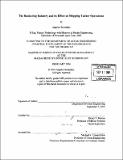The bunkering industry and its effect on shipping tanker operations
Author(s)
Boutsikas, Angelos
DownloadFull printable version (7.507Mb)
Other Contributors
Massachusetts Institute of Technology. Dept. of Ocean Engineering.
Advisor
Henry S. Marcus.
Terms of use
Metadata
Show full item recordAbstract
The bunkering industry provides the shipping industry with the fuel oil that the vessels consume. The quality of the fuel oil provided will ensure the safe operation of vessels. Shipping companies under their fuel oil management programme confirm that the quality and quantity of fuel oil provided are as requested. To be certain of the quality and quantity loaded, correctly performed bunkering procedures need to be integrated in the fuel oil management programme. The data collected through them will prove more than useful when a dispute arises either in terms of fuel oil quality or the loaded quantity. Ship emissions to air are a concern of IMO and recently the European Union, as the shipping industry contrary to land-based industries is not yet subject to any regulations to reduce emissions. Sulphur oxides are targeted as they depend on the sulphur content of the fuel oil. Identical limits are set by both the IMO and the EU, but IMO's regulations are yet to be ratified and EU will not accept any vessels travelling within its waters to bum high-sulphur fuel oil from 2010 onwards. Till then, those involved in the matter might have to consider implementing an emissions trading scheme, as in the land-based industries, as a more viable option to capping sulphur content. Every shipowner is aware of the fact that the single most costly and highly volatile running cost paid is the cost of bunkers. The options available to him/her are hedging instruments such as futures and OTC products. When used effectively along with freight futures, although not yet commonly available, shipping companies may reduce their risk exposure and enhance their profits. (cont.) When purchasing fuel oil from a number of ports, cost savings may be augmented by a carefully improvised bunkering planning, as well as negotiating the price of fuel oil purchased based on its density, aluminum content, viscosity, water content and net specific energy.
Description
Thesis (S.M.)--Massachusetts Institute of Technology, Dept. of Ocean Engineering, 2004. Includes bibliographical references (p. 133-135).
Date issued
2004Department
Massachusetts Institute of Technology. Department of Ocean EngineeringPublisher
Massachusetts Institute of Technology
Keywords
Ocean Engineering.